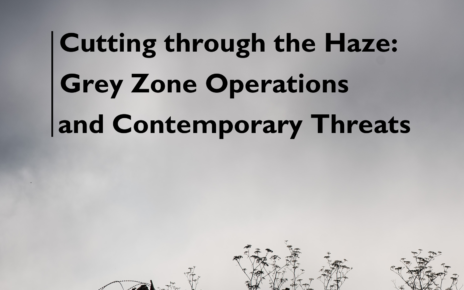Characterized as an ‘infodemic’ by the Director-General of the World Health Organization (WHO), the era of coronavirus has seen high volumes of both non-state and state-sponsored COVID-related “fake news” or online disinformation. Foreign-inspired disinformation campaigns in Russia and China have leveraged social media to amplify coronavirus conspiracy theories and erode trust in public health experts and democratic institutions.
Preliminary research from a University of Sherbrooke survey highlights that one in ten Canadians may believe a coronavirus conspiracy. The Communications Security Establishment (CSE), Canada’s foreign signals intelligence agency, has been monitoring and removing malicious emails and schemes promoting COVID-related disinformation and misinformation.
In response to the rising threats of social media manipulation campaigns and election interference, states around the world have been introducing public, private-sector and technical governance responses to disinformation. Germany’s Network Enforcement Act (NEA) subjects social media networks to fines of up to 50 million euros (US$60) if they do not take down citizen-reported online disinformation. France passed a law allowing judges to order the removal of disinformation during elections. Canada’s federal government has focused on implementing digital literacy initiatives to foster critical thinking and awareness of disinformation. The Canadian federal government is considering adding a law to tackle the infodemic to its toolkit. What are the potential implications of a state-led approach to containing the infodemic?
Anti-“fake news” laws in East and Southeast Asia
In recent years, states in East and Southeast Asia such as Singapore, Malaysia, Cambodia, South Korea, and Taiwan have passed or amended laws aimed at regulating online disinformation.
The coronavirus era and its concomitant infomedic can be considered an initial first test of the effectiveness of these legal initiatives. When states began introducing disinformation laws in 2018, scholars expressed concerns about their vague definitions of “fake news” and susceptibility to weaponization by ruling elites. Examining anti-“fake news” laws in East and Southeast Asia—particularly Singapore’s Protection from Online Falsehoods and Manipulation Act (POFMA), which has acquired a patina of credibility given Singapore’s spot alongside Canada on the International Grand Committee on Disinformation and “Fake News”—provides timely insights into the effects of anti-“fake news” laws on free expression and media freedom.
In October 2019, the POFMA came into effect, arming the long-ruling People’s Action Party (PAP) with comprehensive and wide-ranging powers. Beyond targeting individual creators and circulators of “fake news,” POFMA can instruct social media companies and Internet intermediaries to demonetize pages and block end-users in Singapore from accessing unlawful online content. For non-compliance, POFMA offenders can suffer heavy fines or up to ten years in prison.
Since it was unveiled, the POFMA has largely targeted political dissidents like activist and journalist Alex Tan, who has been issued multiple correction directions for posts on his States Times Review (now Singapore States Times) Facebook page. Many of Tan’s posts levelled powerful accusations against the ruling party. The POFMA has since launched investigations into Tan and blocked and demonetized two of his Facebook pages.
Since the pandemic emerged, the POFMA has removed or targeted comparatively little COVID-related “fake news.” Given the proliferation of COVID-related “fake news,” it has been argued that the POFMA has ‘limited utility’ in the infodemic. In almost every instance where the law did target COVID-related disinformation, the unlawful online content in question also maligned the ruling PAP’s own motives or credibility. Thus, it could be argued that the PAP seems to be leveraging the POFMA, in part, to repair its fractured image.
Singapore is just one among many Asian states that have adopted a “fake news” legal regime in the infodemic. States like Vietnam, Cambodia, Taiwan, and South Korea have also passed or amended existing laws under the pretext of countering “fake news.” While Malaysia’s powerful Anti-Fake News Act was repealed through a long and complicated process last year, the government has since relied on the Communication and Multimedia Act 1998 (CMA) to crack down on disinformation. There have already been numerous arrests for COVID-related “fake news,” including arrests of opposition politicians and journalists espousing criticisms of the federal government.
In 2018, South Korean Prime Minister Moon Jae-in declared a war on “fake news.” A few weeks ago, he reaffirmed this commitment to fighting the infodemic. Police across South Korea have arrested dozens for malicious COVID-related cyber threats including disinformation. Following the heightened threat of Chinese trolls and disinformation campaigns for the 2020 Taiwanese presidential election, Taiwan bolstered its approach to disinformation, amending the Social Order Maintenance Act to include detention for up to three days or a heavy fine for publishing or circulating disinformation. In Taiwan, over 310 people, including ordinary civilians and recent immigrants, have been investigated for creating or sharing COVID-related “fake news.” Concerns have been raised over the perceived culpability of ordinary people who are merely circulating illegal online content that is characterized as “fake news” by the government.
Canada’s efforts and potential next steps
Canada’s federal government has taken a comparatively less forceful approach to containing misinformation and disinformation in the infodemic. Thus far, our government has largely been underscoring the importance of trusting experts and consulting credible sources.
Over the last few weeks, some Canadian MPs helped an MP in the United Kingdom launch Infotagion, a fact-checking website aimed at limiting the spread of COVID-related disinformation on social media. The federal government is also embracing digital literacy, pouring hundreds of thousands of dollars into projects that facilitate “public awareness tools and online workshops, to help Canadians become more resilient and think critically about COVID-19 disinformation.”
Beyond supporting projects and monitoring and removing fraudulent schemes and malicious sites through the CSE, the government has been considering a law. To date, the nuances of such a proposed anti-“fake news” law have not been discussed. It is sensible to extrapolate that a law in Canada would be more like France’s law than Singapore’s. Still, France’s law “against the manipulation of information” has been met with formidable opposition on free expression grounds. The case study of Southeast Asia is also useful to consider as it underlines the limitations of anti-“fake news” laws and their potential misuse.
Disinformation campaigns have been deep and wide-ranging. From a public interest standpoint, there is a strong impetus for the Canadian government to limit foreign-inspired disinformation campaigns from sowing chaos and eroding trust in the pillars of our democracy. At the same time, there are compelling reasons to legislate cautiously and delicately. If an anti-“fake news” law is adopted in Canada, it must be well-conceived and carefully considered.
Featured Image: Backlit keyboard (source: Wikimedia Commons).
Disclaimer: Any views or opinions expressed in articles are solely those of the authors and do not necessarily represent the views of the NATO Association of Canada.




